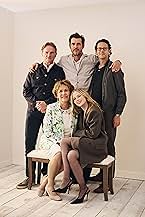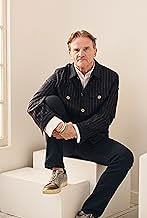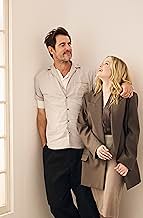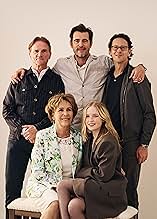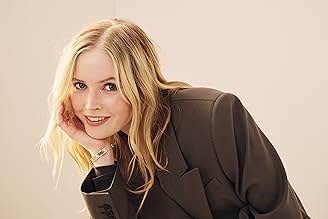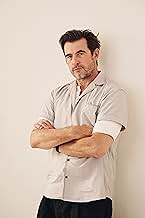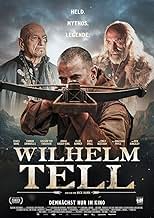En el siglo XIV, en los días del Sacro Imperio Romano Germánico, cuando las naciones de Europa compiten ferozmente por la supremacía y los ambiciosos austríacos, que desean más tierras, inva... Leer todoEn el siglo XIV, en los días del Sacro Imperio Romano Germánico, cuando las naciones de Europa compiten ferozmente por la supremacía y los ambiciosos austríacos, que desean más tierras, invaden Suiza, una nación serena y pastoral.En el siglo XIV, en los días del Sacro Imperio Romano Germánico, cuando las naciones de Europa compiten ferozmente por la supremacía y los ambiciosos austríacos, que desean más tierras, invaden Suiza, una nación serena y pastoral.
- Dirección
- Guionistas
- Elenco
- Premios
- 1 nominación en total
- Dirección
- Guionistas
- Todo el elenco y el equipo
- Producción, taquilla y más en IMDbPro
Resumen
Reviewers say 'William Tell' is lauded for its strong performances, stunning cinematography, and historical authenticity. The narrative of rebellion against tyranny resonates, though dialogue and pacing receive mixed feedback. Some find the script theatrical, and the middle section drags. Historical accuracy and character portrayals are debated. Despite these issues, the film's epic scope and emotional depth make it a compelling historical drama.
Opiniones destacadas
To all the naysayers sharpening their quills, let's get real: William Tell isn't trying to be Braveheart 2.0 (and thank goodness-no one needs another freedom speech in blue face paint). Instead, this film carves out its own niche with a crossbow and a wink.
Sure, some critics are acting like Tell missed the apple and shot their popcorn instead. But let's give credit where it's due: Claes Bang brings more charisma to the Swiss Alps than Mel Gibson brought to the Scottish Highlands. The villains are deliciously over-the-top-Ben Kingsley could probably glare a mountain goat into submission-and the scenery is so gorgeous you'll want to book a flight to Switzerland (or at least Google it).
Is it perfect? No. But neither is Braveheart (historical accuracy, anyone?). If you're looking for a fun, action-packed legend with a dash of heart and a lot less kilt, William Tell hits the mark. So loosen up, critics-sometimes a movie is just a good time, not a history lesson or a revolution.
Let me know if you want more zingers or specific references!
Sure, some critics are acting like Tell missed the apple and shot their popcorn instead. But let's give credit where it's due: Claes Bang brings more charisma to the Swiss Alps than Mel Gibson brought to the Scottish Highlands. The villains are deliciously over-the-top-Ben Kingsley could probably glare a mountain goat into submission-and the scenery is so gorgeous you'll want to book a flight to Switzerland (or at least Google it).
Is it perfect? No. But neither is Braveheart (historical accuracy, anyone?). If you're looking for a fun, action-packed legend with a dash of heart and a lot less kilt, William Tell hits the mark. So loosen up, critics-sometimes a movie is just a good time, not a history lesson or a revolution.
Let me know if you want more zingers or specific references!
An adaptation of Friedrich Schiller's 1804 play of "Wilhelm Tell" and story of the Swiss struggle for independence. Where an act of oppression, followed by unnecessary wrongdoing sparks a response that sets off a chain of events that lead to rebellion. Wilhelm Tell, master of the crossbow, involved in a conflict he would have rather not be a part of..
Visually, the film delivers beautiful landscape shots and a believable period piece, with a nicely-colored and dynamic cinematography and an excellent production! Not to mention a rather large cast of actors that present the material with strong performances.
I've read questioning of the "dialogue", but as a foreigner, I found it was easy to follow at all times and no line particularly annoying or useless.
But.. despite this strong execution, the script lacks surprises, intrigue and excitement. Making the predictable plot an expected retelling of this known story.
Don't get me wrong, it is quite solid and engaging enough.. but for 2-hour film that feels a tad long, I expected something more. It's not what I wanted it to be, but I would recommend it still to those interested and those not familiar with the famous character.
Visually, the film delivers beautiful landscape shots and a believable period piece, with a nicely-colored and dynamic cinematography and an excellent production! Not to mention a rather large cast of actors that present the material with strong performances.
I've read questioning of the "dialogue", but as a foreigner, I found it was easy to follow at all times and no line particularly annoying or useless.
But.. despite this strong execution, the script lacks surprises, intrigue and excitement. Making the predictable plot an expected retelling of this known story.
Don't get me wrong, it is quite solid and engaging enough.. but for 2-hour film that feels a tad long, I expected something more. It's not what I wanted it to be, but I would recommend it still to those interested and those not familiar with the famous character.
So... I came for arrows and rebellion.
I stayed for moody stares and dramatic cloak-swishing. And I left wondering: was this a freedom fighter or a medieval therapist with anger issues?
Claes Bang plays William Tell like he's auditioning to be the next Batman - dark, brooding, and emotionally constipated. The man shoots maybe one arrow, but delivers about 947 intense silences. Respect.
Ben Kingsley shows up and casually steals every scene with the smug energy of someone who knows this isn't going to win any awards - and doesn't care. Icon.
Highlights: Gorgeous Swiss mountains.
Enough slow-motion stares to power a shampoo commercial.
Historical drama that thinks it's Shakespeare but sometimes feels more like a LARP gone rogue.
Lowlights: Pacing so slow, I checked my pulse. Twice.
A hero with all the charisma of a wet log.
Dialogue so dramatic, it circles back to being hilarious.
Bottom line: It's not a bad movie. It's just very committed to being serious... even when it really shouldn't be. Like wearing full armor to a garden party.
Watch it with wine. Or snacks. Or while folding laundry. You won't miss much if you blink - or nap.
I stayed for moody stares and dramatic cloak-swishing. And I left wondering: was this a freedom fighter or a medieval therapist with anger issues?
Claes Bang plays William Tell like he's auditioning to be the next Batman - dark, brooding, and emotionally constipated. The man shoots maybe one arrow, but delivers about 947 intense silences. Respect.
Ben Kingsley shows up and casually steals every scene with the smug energy of someone who knows this isn't going to win any awards - and doesn't care. Icon.
Highlights: Gorgeous Swiss mountains.
Enough slow-motion stares to power a shampoo commercial.
Historical drama that thinks it's Shakespeare but sometimes feels more like a LARP gone rogue.
Lowlights: Pacing so slow, I checked my pulse. Twice.
A hero with all the charisma of a wet log.
Dialogue so dramatic, it circles back to being hilarious.
Bottom line: It's not a bad movie. It's just very committed to being serious... even when it really shouldn't be. Like wearing full armor to a garden party.
Watch it with wine. Or snacks. Or while folding laundry. You won't miss much if you blink - or nap.
Hmmm. Never before have I heard anyone proudly declare "We are Swiss" in quite such an underwhelming manner before, and that rather sums up the lacklustre performance of Claes Bang as the title character in this verbose crossbow chronology. Traumatised by his experiences in the Crusade, he's now not a natural rebel but is instead content to live peaceably with his wife and son. When he comes to the rescue of a stranger whose wife had just been raped and murdered by the occupying troops of the King of Austria (Sir Ben Kingsley) his former valiance is rekindled and releases all manner of hell on his unprepared, unarmed and unsuspecting people. Pursued by the maniacal "Gessler" (Connor Swindell) and his blonde henchman "Stussi" (Jake Dunn), he has to rediscover his skill with the arrow, and yes - there's the legendary scene with the apple and the boy's head! There is some stunning Alpine photography mingled in with the pretty obvious CGI, and to be fair to it there are plenty of action scenes as Tell and his rapidly increasing circle of friends proves to be quite adept at reducing their foes to wriggling corpses. Sir Ben has managed to fish out his eye patch from "The Last Legion" (2007) but like Sir Jonathan Pryce, he doesn't really feature enough to make much more than a few cameo appearances to add a little bit of Thespian gravitas to this rather sterile and flat history. The characters are really lacking in charisma in this film and the long-winded dialogue and charm-free efforts from all but, perhaps, Dunn - think a weedier version of "Stamper" from "Tomorrow Never Dies" (1997) just don't really resonate much at all. There's plenty of attention to the creative detail with the costumes and castles all fitting the bill nicely but it's probably half an hour longer than it needs to be and screams sequel at us at it's all rather rushed end.
I watched the world premiere of William Tell at the Toronto International Film Festival (2024).
The presenter of the festival had said before the movie, "they don't make movies like this anymore". I assumed that was a positive thing.
Unfortunately, it really wasn't. The biggest issue of the movie was the language used.
This is a 14th-century period piece that involved the Swiss and Austrians. But for whatever reason the dialogue was written in something that sounded like a high-schooler's approximation of Victorian English.
According to the director, he wrote the dialogue to have language unique to the film. Maybe to assist in some sense of believability within this world. Instead the film was often hard to follow. Character motivations were lost in the flowery, disjointed language.
That being said - the cast did their absolute best with the film. Golshifteh Farahani, Connor Swindells, Rafe Spall, and Ellie Bamber were standouts.
Don't go to see the film for Ben Kingsley - he was barely in it and his performance felt completely phoned in.
If you're okay with 2-hours of mindlessness as you watch beautiful scenery and cool fight scenes - I think there is enough to enjoy.
The movie set up a sequel. I do hope it can be made, and some changes to how dialogue and character interactions are done will be made.
The presenter of the festival had said before the movie, "they don't make movies like this anymore". I assumed that was a positive thing.
Unfortunately, it really wasn't. The biggest issue of the movie was the language used.
This is a 14th-century period piece that involved the Swiss and Austrians. But for whatever reason the dialogue was written in something that sounded like a high-schooler's approximation of Victorian English.
According to the director, he wrote the dialogue to have language unique to the film. Maybe to assist in some sense of believability within this world. Instead the film was often hard to follow. Character motivations were lost in the flowery, disjointed language.
That being said - the cast did their absolute best with the film. Golshifteh Farahani, Connor Swindells, Rafe Spall, and Ellie Bamber were standouts.
Don't go to see the film for Ben Kingsley - he was barely in it and his performance felt completely phoned in.
If you're okay with 2-hours of mindlessness as you watch beautiful scenery and cool fight scenes - I think there is enough to enjoy.
The movie set up a sequel. I do hope it can be made, and some changes to how dialogue and character interactions are done will be made.
¿Sabías que…?
- TriviaDespite being a national hero in Switzerland, there is no concrete historical evidence that William Tell ever existed.
The earliest written account of the story appears in a 15th-century chronicle called the "White Book of Sarnen", more than a century after the events are supposed to have taken place.
Furthermore, the act of the hero shooting an apple from his son's head stems from the saga of Toko, who was a servant of the Danish King Harald Bluetooth, who died in 985. Likewise, Toko's story was written down more than two hundred years later, in the epic tale "Gesta Danorum".
Many historians view William Tell as a purely legendary figure, though his story was deeply embedded in Swiss national identity by the time of its writing.
- ErroresThe various castles are shown in their modern forms. Specifically, they have a large number of windows. These were all cut several centuries after the period in which the story is set, when castles were no longer required to be fortresses.
- ConexionesVersion of Guillaume Tell et le clown (1898)
Selecciones populares
Inicia sesión para calificar y agrega a la lista de videos para obtener recomendaciones personalizadas
- How long is William Tell?Con tecnología de Alexa
Detalles
- Fecha de lanzamiento
- Países de origen
- Sitio oficial
- Idioma
- También se conoce como
- William Tell
- Locaciones de filmación
- Productoras
- Ver más créditos de la compañía en IMDbPro
Taquilla
- Total en EE. UU. y Canadá
- USD 43,088
- Fin de semana de estreno en EE. UU. y Canadá
- USD 26,554
- 6 abr 2025
- Total a nivel mundial
- USD 680,624
- Tiempo de ejecución2 horas 14 minutos
- Color
- Mezcla de sonido
- Relación de aspecto
- 2.39 : 1
Contribuir a esta página
Sugiere una edición o agrega el contenido que falta

Principales brechas de datos
What is the Canadian French language plot outline for Guillermo Tell (2024)?
Responda

